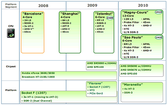- Joined
- Oct 9, 2007
- Messages
- 47,322 (7.52/day)
- Location
- Hyderabad, India
| System Name | RBMK-1000 |
|---|---|
| Processor | AMD Ryzen 7 5700G |
| Motherboard | ASUS ROG Strix B450-E Gaming |
| Cooling | DeepCool Gammax L240 V2 |
| Memory | 2x 8GB G.Skill Sniper X |
| Video Card(s) | Palit GeForce RTX 2080 SUPER GameRock |
| Storage | Western Digital Black NVMe 512GB |
| Display(s) | BenQ 1440p 60 Hz 27-inch |
| Case | Corsair Carbide 100R |
| Audio Device(s) | ASUS SupremeFX S1220A |
| Power Supply | Cooler Master MWE Gold 650W |
| Mouse | ASUS ROG Strix Impact |
| Keyboard | Gamdias Hermes E2 |
| Software | Windows 11 Pro |
The chipset division of AMD really is reminiscent of former ATI Technologies that jumped into the business of making chipsets looking at rival NVIDIA's success with nForce series. After being acquired by AMD, the chipset division started making chipsets under the AMD banner. AMD has had a good amount of success with its recent 7-series chipsets for the desktop platform. It has managed to snatch a 20% market share away from NVIDIA which even today leads in market share for platform core-logic technologies for AMD. Not only have they had a desktop line of nForce products but also an equally popular enterprise chipset for the Opteron platform in the form of nForce Professional series server and workstation core-logic.

Opteron still holds a respectable position in the enterprise CPU market thanks to its supposedly more efficient virtualization capabilities. As of now, NVIDIA and Broadcom make chipsets for it. With current chipsets however, the K10 technology hits a roadblock when it comes to system bus bandwidth. Socket 1207 boards that came out before Barcelona that supported the dual-core Santa Rosa processors while promising Barcelona support had chipsets that lacked HyperTransport 3.0 support. The result was that multi-socket Barcelona boards were severely crippled as far as system bus went. Barcelona didn't support HyperTransport 3.0 itself either. In multi-socket boards, 2000 MT/s is all the bandwidth two Barcelona chips had to make do with. AMD assures to set this right with the upcoming Shanghai Opteron quad-core chips where the processors feature improved 5200 MT/s HyperTransport 3.0 interfaces. It then boils down to chipsets supporting it. News is that NVIDIA will be working on such a chipset that provides such bandwidth to individual sockets and their peer-to-peer communication that helps improve virtualization. Within 2009, AMD will be out with a enterprise-grade chipset made by its chipset division.
AMD will introduce the SR5690 and SP5100 northbridge chips. These would be aided by SS7100 southbridge chips. These chipsets offer the features AMD's enterprise platforms have been begging for, such as full-speed HyperTransport 3.0 system interface at 5200 MT/s, PCI-Express 2.0 with hotplug capabilities, and an I/O Memory Management Unit (IOMMU). This part is said to provide significant boosts to virtualization efficiencies by providing better peer-to-peer communication between sockets and direct communication between CPUs and devices. Additionally, the IOMMU is said to enhance security by preventing unauthorized memory access by devices. The SP5100 however is said to lack the IOMMU.
In other news, these chipsets come out around the same time when AMD introduces its 6-core Opteron processor codenamed Istanbul.
View at TechPowerUp Main Site

Opteron still holds a respectable position in the enterprise CPU market thanks to its supposedly more efficient virtualization capabilities. As of now, NVIDIA and Broadcom make chipsets for it. With current chipsets however, the K10 technology hits a roadblock when it comes to system bus bandwidth. Socket 1207 boards that came out before Barcelona that supported the dual-core Santa Rosa processors while promising Barcelona support had chipsets that lacked HyperTransport 3.0 support. The result was that multi-socket Barcelona boards were severely crippled as far as system bus went. Barcelona didn't support HyperTransport 3.0 itself either. In multi-socket boards, 2000 MT/s is all the bandwidth two Barcelona chips had to make do with. AMD assures to set this right with the upcoming Shanghai Opteron quad-core chips where the processors feature improved 5200 MT/s HyperTransport 3.0 interfaces. It then boils down to chipsets supporting it. News is that NVIDIA will be working on such a chipset that provides such bandwidth to individual sockets and their peer-to-peer communication that helps improve virtualization. Within 2009, AMD will be out with a enterprise-grade chipset made by its chipset division.
AMD will introduce the SR5690 and SP5100 northbridge chips. These would be aided by SS7100 southbridge chips. These chipsets offer the features AMD's enterprise platforms have been begging for, such as full-speed HyperTransport 3.0 system interface at 5200 MT/s, PCI-Express 2.0 with hotplug capabilities, and an I/O Memory Management Unit (IOMMU). This part is said to provide significant boosts to virtualization efficiencies by providing better peer-to-peer communication between sockets and direct communication between CPUs and devices. Additionally, the IOMMU is said to enhance security by preventing unauthorized memory access by devices. The SP5100 however is said to lack the IOMMU.
In other news, these chipsets come out around the same time when AMD introduces its 6-core Opteron processor codenamed Istanbul.
View at TechPowerUp Main Site
Last edited:


